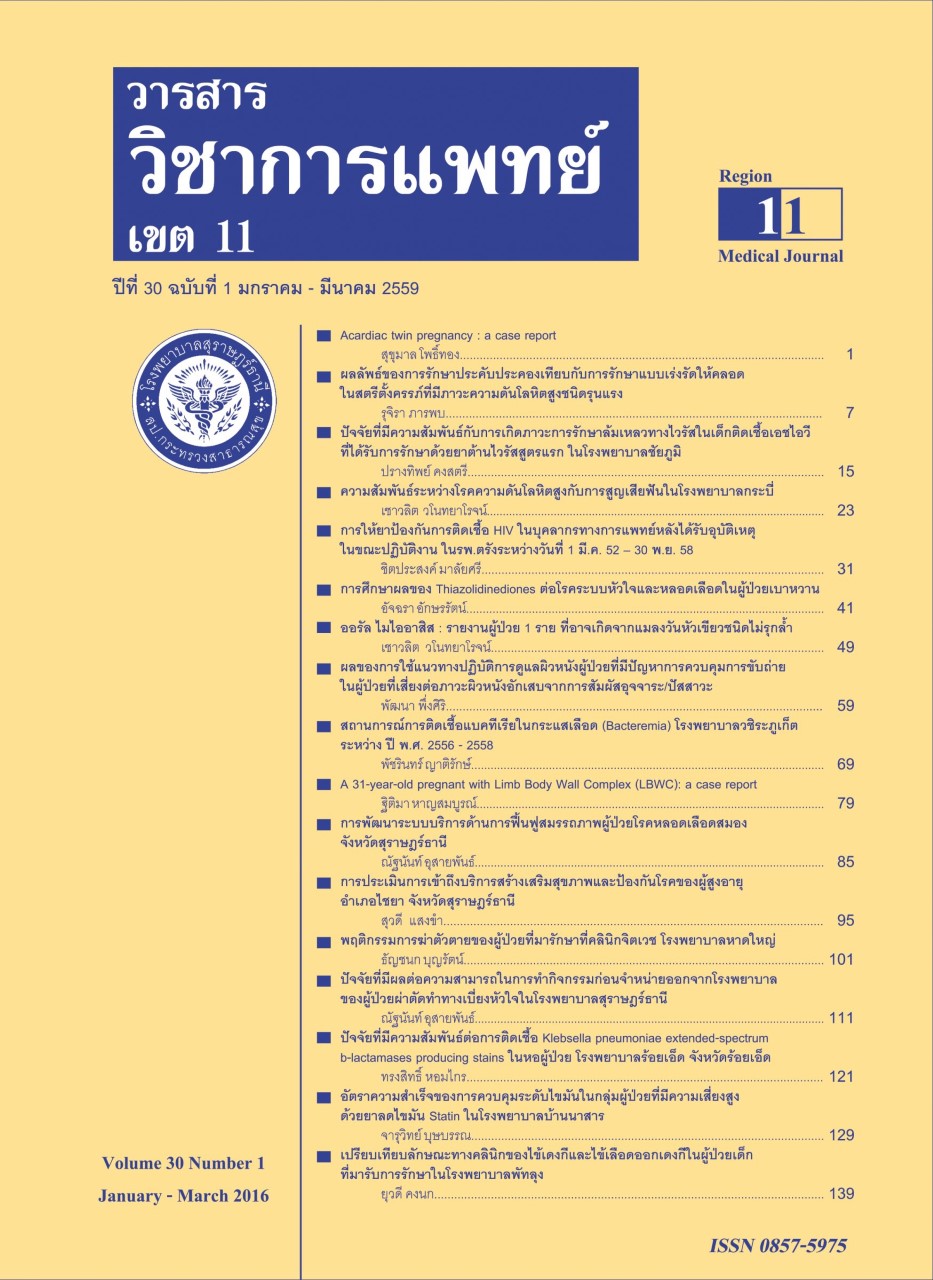Outcome of Expectant and Aggressive management in Pregnancy with severe preeclampsia
Keywords:
Severe preeclampsia, aggressive management, expectant management, maternal and perinatal outcomesAbstract
Objective : To compare maternal and perinatal outcomes in expectant and aggressive management in severe preeclamptic women between 28 to 33 weeks’ gestation Methodology : Cross sectional study was conducted in 50 women with severe preeclampsia between 28-33 weeks’ gestation who admitted at Maharaj Nakornsrithammarat hospital from January 2011 to October 2014. Cases were devided into two groups, aggressive (n=25) or expectant
management (n=25). Aggressive management patients were prepared for delivery, either by cesarean or induction, 48 hours after glucocorticoids
therapy. Expectant management patients were managed with bed rest, oral antihypertensives and intensive antenatal fetal testing. I compared maternal and perinatal outcomes in both groups. The data analyzed by t-test and chi-square test.
Results : There was no difference between the two groups in mean systolic blood pressure (170 9.7 VS 172 9.4 mmHg), diastolic blood pressure (110 4.2 VS 112 5.4 mmHg) and gestational age (30.7 1.6 VS 30.4 1.5 weeks). The average latency period in the expectant management group was 15.4 days (range 4 to 28 days), which was significant higher than the average of 2.4 days in group 1 (P < 0.001, range 2-3 days). The expectant management group had a significant higher gestational age at delivery (32.9 1.8 VS 30.6 1.7 weeks, P < 0.001) higher birth weight, (1,692 548 VS 1,286 364 gms, P = 0.004), lower incidence of admission to the neonatal intensive care unit (76% VS 92%, p = 0.002). The two groups had similar incidence of abruption placenta (4%). There were no eclampsia, perinatal death or maternal death.
Conclusion : Expectant management in severe preeclampsia before 34 weeks’ gestation, with close monitoring of mother and fetus in a tertiary-care center with adequate maternal and neonatal facilities reduced neonatal complications there aggressive management.
References
2. Sibai BM, Taslimi M, Abdella TN, Brooks TF, Spinnato JA, Anderson GD. Maternal and perinatal outcome of conservative management of severe preeclampsia in midtrimester. Am J Obstet Gynecol 1985; 152: 32-7.
3. Cunningham FG, Leveno KJ, Bloom SL, Hauth JC, Rouse DJ, Spong CY. Williams Obtetrics 23rd ed. New York: McGrew-Hill, 2010; 706-56.
4. Crowley P. Prophylactic corticosteroids for preterm birth. Cochrane Database Syst Rev 2000; 2: CD000065.
5. Dudley DJ, Waters TP, Nathanielsz PW. Current status of single course antenatal steroid therapy. Clin Obstet Gynecol 2003; 46: 132-49.
6. Sibai BM, Akl S, Fairlie F, Moretti M, A protocol for managing severe preeclampsia in the second trimester. An JOBSTET GYNECOL. 1990; 163:733-8.
7. Haddad B, Deis S, Goffinet F, Paniel BJ, Cabrol D, Siba BM. Maternal and perinatal outcomes during expectant management of 239 severe preeclamptic
women between 24 and 33 weeks, gestation. Am J Obstet Gynecol 2004; 190: 1590-7.
8. Odendaal HJ, Pattinson RC, Bam R, Grove D, Kootze TJ. Aggressive or expectant management for patients with severe preeclampsia between 28-33 weeks’ gestation: a randomized controlled trial. Obstet Gynecol 1990; 76: 1070-5.
9. Fenakel K, Fenakel G, Appelman Z. Nifedipine in the treatment of severe preeclampsia. Obstet Gynecol 1991; 77: 331-7






